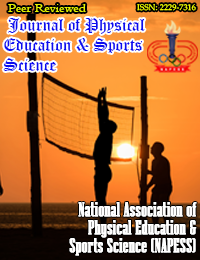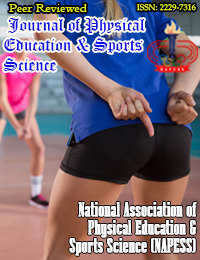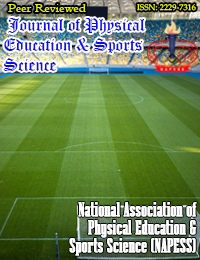Opportunities and Challenges of Health Education
Download PDF
Healthcare education and promotion represents a large and ever-expanding field of medical and educational professionals, whose tireless work is aimed at informing the public about a wide range of growing healthcare and wellness concerns through educational initiatives. The goal of the profession is to maintain optimal public awareness of ongoing issues and rising current threats, so that people may better be prepared when making decisions about their own medical care and lifestyles. To this end, there are many specialized roles within this discipline. These specializations exist for one of two purposes: to focus on a particular healthcare issue or to reach the general public in specific ways. Health educators are uniquely positioned to address public health needs by deploying their training and competencies in the application of behavioral theories across a wide range of interventions designed to improve population health. Health educators use a holistic approach to changing health behaviors, implementing evidence-based interventions and adapting to changing population needs A promotional specialist is something of a general practitioner within this profession's range of careers, in terms of how they interact and who they interact with Some might work with large organizations or other communities, while others might take a patient-by-patient approach. Where they tend to focus is on particular areas of concern.
Opportunities and Challenges of Health Education
K M SARAVAN
Physical Cultural Instructor
Government First Grade College, Ramdurg
Dist -Belagavi
State- Karnataka
saravankm1@gmail.com
Abstract
Healthcare education and promotion represents a large and ever-expanding field of medical and educational professionals, whose tireless work is aimed at informing the public about a wide range of growing healthcare and wellness concerns through educational initiatives. The goal of the profession is to maintain optimal public awareness of ongoing issues and rising current threats, so that people may better be prepared when making decisions about their own medical care and lifestyles. To this end, there are many specialized roles within this discipline. These specializations exist for one of two purposes: to focus on a particular healthcare issue or to reach the general public in specific ways. Health educators are uniquely positioned to address public health needs by deploying their training and competencies in the application of behavioral theories across a wide range of interventions designed to improve population health. Health educators use a holistic approach to changing health behaviors, implementing evidence-based interventions and adapting to changing population needs A promotional specialist is something of a general practitioner within this profession's range of careers, in terms of how they interact and who they interact with Some might work with large organizations or other communities, while others might take a patient-by-patient approach. Where they tend to focus is on particular areas of concern.
Introduction
They serve in a variety of settings, and can use appropriate educational strategies and methods to facilitate the development of policies, procedures, interventions, and systems conducive to the health of individuals, groups, and communities. Health education specialists can be found in a variety of settings, including hospitals, clinics, schools and universities, government offices, businesses and non-profits, and more. Being active doesn’t have to mean taking out an expensive gym membership, jogging at 5am or sporting spandex. There are so many ways to be active and they can all help to improve your mental health. Taking part in physical activities can be a great way to meet people. They can also offer us the chance of taking a well-deserved break from the hustle and bustle of daily life. Leading an active life can help to improve your feelings of self-worth and foster confidence. Taking part in a form of physical activity that you really enjoy can give you a goal to aim for and a sense of purpose A health educator is "a professionally prepared individual who serves in a variety of roles and is specifically trained to use appropriate educational strategies and methods to facilitate the development of policies, procedures, interventions, and systems conducive to the health of individuals, groups, and communities
Community Health Education
- Community Health Educator
- Education Program Manager
- Case Manager
- Alcohol Educator
- Family Services Specialist
- Community Outreach Coordinator
- Program Resource Coordinator
- Community Organizer
- Health Education Programmer
Business and Non-Profit Health Education
- Health Literacy Program Coordinator
- Clinical Research Specialist / Coordinator
- Wellness Consultant
- Health Coach
- Integrative Health Practitioner
- Corporate Trainer
- Employee Wellness Coordinator
- Worksite Safety Coordinator
- Health Education Director
- Cultural Competency Trainer
- Health Media Director
- Grant Writer
- Health Journalist
Academia and University Health Education
- Adjunct Faculty
- Assistant Professor
- Curriculum Development Specialist
- Health Programs Management Director
- Education Outreach Liaison
- Education Director
- Health Promotion Programmer
- Health and Wellness Coordinator
Health Care
- Community Outreach Coordinator
- Health and Wellness Coordinator
- Medical Resource Manager
- Patient Education Director
- Patient Care Coordinator
- Biometric Health Screener
- Nutrition Services Coordinator
- Community Benefits Manager
- Prevention Program Director
- Lactation Consultant
- Cancer Information Specialist
Goals for Health Educators in Public Health
The employers, insurance companies, and governments try to find methods to improve the quality of healthcare outcomes while keeping costs down. Health educators teach people how to live the healthiest possible lives to help reduces the need for avoid costly medical procedures by reducing the incidence of diseases. Changes in an individual’s lifestyle can help to lower significantly the likelihood of contracting illnesses, such as lung cancer, skin cancer, HIV, and heart disease. When an individual already has a disease such as asthma, health educators help patients to understand proper methods to manage their condition thereby avoiding unnecessary visits to the emergency room. Health educators teach people to understand how their lifestyle can affect their health outcomes. Some of the responsibilities for Health Educators are to Help stop the spread of sexually transmitted diseases including cervical cancer and HIV.Educating teens to become aware of the dangers of unprotected sex, alcohol and drug abuse Reduce obesity and other related health problems in both youth and adult populations Improving the quality of life our growing population of seniors Designing and implementing health promotion programs including smoking cessation, water and sanitation projects and occupational safety courses.
Physical and Health Education Career Opportunities
Several different career opportunities are available for individuals interested in a career in physical education or health education. Below are a few of the most common choices an online degree in education can help prepare you for. Coaches in elementary and secondary schools teach students the basic rules of team sports, as well as proper form and techniques. They run practice sessions and manage the team during competitions or games with other teams. Health teachers teach students about various mental, physical, emotional and sexual health issues in a classroom setting. They provide information and lead discussions on topics such as nutrition, safe sex, tobacco use, drug and alcohol abuse, and medicine. Physical education teachers, also known as PE or gym teachers, teach students the rules and motor skills necessary to participate in individual and team sports. PE teachers at elementary schools usually teach half-hour classes to various groups of students throughout the day, while teachers at secondary schools might teach fewer but longer classes. Athletic administration programs also offer those who currently work in the field of sports a chance to broaden their knowledge and explore other career possibilities within the sports industry. A gym teacher, also called a physical education teacher, instructs students on principles of fitness and health. Topics covered may include nutrition, well-being, and exercise. Fitness instructors may work with individuals or groups. They demonstrate and teach proper techniques when exercising or using gym equipment. These fitness professionals assist clients with cardiovascular workouts, strength training and stretching. By demonstrating proper technique, correcting participants and explaining the value of particular movements, group exercise instructors help individuals get the most out of their exercise experience and surrounded by a culture that is creating an epidemic of childhood obesity, of kids abusing drugs at younger and younger ages, and that advertises tobacco products specifically to appeal to them. If we don’t counter those cultural messages with information and support for making good choices, then we jeopardize both children and their parents who are trying to raise kids who will be healthy, productive members of society Most of us who are now adults, learned about the human body, health and disease, physical fitness and nutrition not just from our parents, but in school. Where will Maine communities be in 5 years, 10 or 20 years if we don’t ensure that our children learn about their own health and understand how to preserve it? The financial and social toll of disease and addiction will continue to erode our society if we do not prioritize health education at the core of our most basic skills-teaching in school. Math and reading are essential, but so is our health. Effective curricula result in positive changes in behavior that lower student risks around: alcohol, tobacco, and other drugs, injury prevention, mental and emotional health, nutrition, physical activity, prevention of diseases and sexuality and family life.
Conclusion
Health education promotes learning in other subjects. Studies have shown that reading and math scores of students who received comprehensive health education were significantly higher than those who did not. In general, with information and support for making good choices, then we jeopardize both children and their parents who are trying to raise kids who will be healthy, productive members of society Most of us who are now adults, learned about the human body, health and disease, The goal of the profession is to maintain optimal public awareness of ongoing issues and rising current threats, so that people may better be prepared when making decisions about their own medical care and lifestyles. Physical fitness and nutrition not just from our parent’s healthy students learn better. They have higher attendance, have better grades, and perform better on tests.
Reference
- Anderson G. Chronic Care: Making the Case for Ongoing Care. Princeton (NJ): Robert Wood Johnson Foundation; 2010. https://www.rwjf.org/en/library/research/2010/01/chronic-care.html. Accessed January 25, 2018.
- National Association of County and City Health Officials. The changing public health landscape: findings of the 2015 Forces of Change Survey. http://nacchoprofilestudy.org/forces-of-change/2015-forces-of-change/. Accessed January 25, 2018.
- Cottrell, Girvan, and McKenzie, 2009.
- "Health Education Specialist Practice Analysis II 2020 Validates and Reveals Eight Areas of Responsibility for Health Education Specialists". Www.nchec.org. Retrieved 2020-04-21.

















